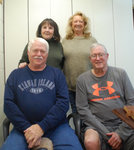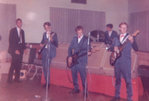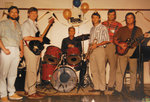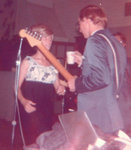By DAWN HANKINS - dhankins@t-g.com
The band Chicago had a lot of major hits in the 1960s and 1970s - music which would inspire young people like David Beavers of Shelbyville to pick up a brass instrument and play keyboard. It also inspired a lot of other young kids here to play ‘their own kind of music’ in the community.
In 2022, David and band friends, most now on the back and front side of 70, note those were times in Shelbyville which shouldn’t be forgotten. The dances, the music, the good times are all a piece of the iconic, local fabric.
David called together recently sort of a mini reunion at the T-G. It was a time to chat with some of his life-long friends — those who attended those local dances and played in bands at the American Legion building when they were teens. Charles Carney was one.
Debbie Carney and Brenda Ayers note they didn’t play but were sort of like the band “groupies.” Their teen years were the days of “shake it, shake it, shake it” type rock and roll music. They note with a laugh that Brenda’s nickname was “Bozo,” because of her hair. She is still today called that by her friends.
On the few TV channels available here, they watched shows like “Batman, The Addams Family and Get Smart.” It was actress Barbara Feldon (Agent 99) who happened to set the mod fashion and frosty lipstick trends of their era.
They note while a lot of the world had already entered the drug culture, Shelbyville youth, for the most part, were slow to adopt those ways. They were staying out of trouble by playing tunes at the local American Legion building.
For David, Brenda, Debbie and Charles, it was a serious time to grow up. The draft was going on for the Vietnam War.
Interested in music early on, David’s first piano teacher was Kathleen Rhodes. In high school, he had Billie Crowell as a music teacher.
“She let me do anything I wanted. I was in a band at the time . . . we did classical stuff.”
David and others weren’t allowed to attend Woodstock. Still, he and his friends made their own rock and roll here.
“I remember . . . had a piano back in my room. I played trumpet.”
“You guys were so handsome,” says Brenda, a.k.a. “Bozo.”
Growing up in Shelbyville
During the recent mini reunion, David brings out a small, decorative box which has a photo embossed on the top. It’s of this band, Wings of Lindbergh. “We won the Battle of the Bands here, in 1967. We were on the Jerry Lewis Telethon.”
He talks about the late Chris Shofner (former T-G editor), another great friend and band member. There are humorous stories, but a sadness that such musicality among local teens is no longer here.
The group talked about the songs they played like, “I Wonder What She’s Doing Tonight?” made famous by Tommy Boyce and Bobby Hart. It was a bunch of cool dudes, rocking the bass, they note.
No doubt, they were “cool cats” playing around here, Brenda advised. She said Tony Gregory and the Playboys was one of the early 1960s bands she remembers starting it all off.
“I can remember going to their dances; he was so mellow,” recalls Brenda. “You just wanted to melt into his songs.”
One of his best cover songs was, “What Am I Living For?” Brenda sings some of the lyrics.
She remembers band members Sonny Smotherman, Jerry Woodard, Don Baker and Mackie Brasier who served as the drummer - many of them already passed. “I can remember them playing at the American Legion.”
The group of friends point out the band in an old Times-Gazette newspaper clipping, which Debbie and Charles brought along to their meeting.
Brenda, who attended all the dances, graduated from Shelbyville Central High in 1967, along with Mike Whitney, also a band player, who died last April. David notes upon his friend Mike Whitney’s passing, he sold his electronic keyboards. He doesn’t play anymore.
David graduated from SCHS in 1972, with Mike’s brother, Mark Whitney (now living in Texas.)
She recalls how Carol Phillips, a local teacher, took care of the Legion building while they danced. “Some of the best times were there,” said Brenda with a smile. “We would dance, dance and dance.”
Making that music was David and band. “We were The Train,” notes David. “We were The Train — before the current Train (pop band) came out.”
David said band leader, Mike, made a rule that they did not play more than once every 6 weeks in Shelbyville. That kept things fresh and hip, he said.
And the bands played on
Brenda asks the group, “Who was the first drummer for The Sensations?” It took them a few minutes to recall some, but they began reminiscing. Their conversations shifted to other local 1960s bands, like George Washington Bridge and The Sensations — some a bit ahead of their time. Among those in George Washington Bridge were Gary Giles and Jimmy Taylor.
Brenda notes the band events were encompassed in a healthy environment, that is, there was no alcohol. It was clean fun, they note. Otherwise, their parents would have known and not allowed them to attend.
They weren’t going to mess up their fun.
David and Charles continued to talk about bands. They remembered Ben Landers played drums as did Tom Magruder.
Some of the others bands they remember playing at the Legion were: Salt & Pepper, The Roustabouts, The Spice of Life, Shades of Gray, Hibbie Jibes, Scotch of St. James, Young Rebel Review with Brent Woodard, Mayflower Compact, Georgia Brown, The Basement Wall, Aesop’s Fables and The Mystics.
They remember players like the late John Stewart, who went on to be a well-known saxophonist and the late George Tittsworth. They reminisce about the Salt & Pepper Band, which they have memories of being really good.
Likely one of their favorite business people in Shelbyville was Austin Davis, better known here as “Pinkie.” He ran the local record shop on Depot Street. Remember: Their generation listened to vinyl records.
The groupies, dances
As the bands were warming up on Friday and or Saturday nights, the “groupies” were getting all dolled up for the dances at the Legion. It was a right-of-passage they respected and loved.
“My sister and I would get up every Saturday morning and clean that house . . . so we could get that dollar, so we could go to the dance,” recalls Brenda.
Debbie agrees, but remembers there were rules. “My daddy would say, you can go, but don’t you leave that building.”
Charles said his parents chaperoned the dances. So, he had to be on his toes.
David notes as a teen, his parents forbid him to go to a local hangout called The Cellar. There was smoking and it was a bit more adult-themed, he recalls. At least that’s what his parents told him, when they said ‘no.’
The Cellar was in the basement of what is now Sutton Realty on Lane Parkway. Debbie remembers Mickey Baker, a local policeman, keeping guard at the venue.
Shelbyville legend has it that people would be wall-to-wall people at The Cellar. In fact, it was known that the room would get so humid, the room was almost like a sauna at times. “It was every Friday and Saturday night,” Debbie says.
“Once I started driving, I could go down there,” advised David with a chuckle. His band also played at The Armory in Tullahoma.
Charles recalls of the dances, sometimes themed “sock hops,” “Sometimes we would have people coming from everywhere . . . . It was the Vietnam War era. The GIs would be in.”
The legal drinking age back then was 18. So servicemen between 18 and 20 frequented the place, when they were home on leave.
David, an only child, remembers he bypassed the draft; he was headed to college. His dad was a WWII veteran. His mom simply didn’t want him to register for the draft. “I’ll never forget what my dad said, ‘Let him go.’”
Debbie and Brenda reminisce about “famous people” who played in Shelbyville like Franklin’s Robert (Peebles) Knight & the Fairlanes (“Everlasting Love” fame), Charley McCoy & The Escorts (McCoy went on to become famous Nashville Sound entertainer), and The Gentrys (“Keep on Dancing” fame.)
They remember the lyrics for “Keep on Dancing” — “I keep on dancin’, Keep on doin’ the jerk right now, Shake it, shake it, baby, Come on and show me how you work . . . .”
There is laughter in the room. They sigh at the thought those good times.
On with their lives
David recalls his band, Train, broke up when all the band members headed off to college around 1973. He said their genre of weekend entertainment tapered off here, then, as far as venues offering a place for teens to hangout.
“We went to so many dances at the American Legion, didn’t we?” Brenda says, looking at Debbie.
David said it was always their dates who took up the money at the dances. With a laugh they note how they certainly didn’t go to college on that money, but it was good pocket change for the times.
“Some nights, we made $30 apiece,” recalled David. “That was a lot of money, back in 1970. The band made $200 or $300 . . . had to pay the guard $25 a night for security.”
Debbie adds, “This just brings back so many memories.” She mentioned other players from Shelbyville, including the late Knox Morton and drummer Tom Magruder.
Charles brings out at that point that he has some DVD-Rs of the “Bedford Bands of the 1960s and 1970s.” They consider those recordings to be a “wealth of information” about a special time of music evolving within this city.
They talked about other band members John Jensen and the late Mack Palmer. David reminisces how he was life-long friends with band member Chris Shofner.
Chris, who loved BB King music, and David, received their Eagle Scout awards together and attended First Presbyterian Church. He remembers Train and Wings of Lindbergh jamming to Chicago and Three Dog Night songs.
Debbie then remembers a favorite song, “My Girl” by the Temptations, which was still being played when they were teens.
David remembers “Mustang Sally,” made famous by Wilson Pickett, being played by the bands. “Mike Whitney sang those songs . . . so good at singing those songs.”
In fact, though professionally a graphic artist, Mike’s obit in the T-G last April stated that his greatest passion was rock drumming. His drumming career began while in high school and he went on to play with numerous bands while living in St. Louis, Mo.
David is sad that so many of his friends and band members, like Mike, Mack and Chris, have already passed. But time marches on. This rock and roller, however, is still going to concerts in 2022. With digital technology now at his fingertips, he can listen to songs by bands like The Guess Who or the Byrds on an MP3 player or on YouTube.
But nothing beats hearing a live band, he professes. In fact, he has three receipts from concerts by Billy Joel and Elton John saved in a special place.
But most of this reunion group’s smiles came from looking at Debbie’s scrapbook. They note how some of the folks in the bands still play area venues, but that is very few these days.
For the most part, they now listen to their genre of music on “Solid Gold Oldies” channels.
Debbie advises how several local band members now play for nursing homes. She observes with a laugh that they love their music. “They’re now us!”
The group talked about their teen days of going to the old swimming pool (then located behind what is now the Celebration grounds.) They recall Coach Ed Carson would let kids hang out there. One particular day stands out in Debbie’s memory.
A young Shelbyville man by the name of Kenneth Beckman had his orders to go to Vietnam. Debbie recalls of that day, “He sat and played flat top guitar. It was great. That was the last time we saw him, because he didn’t make it back.”
These are the memories they now tell their own families. It was a time of organic music—one they still consider historic in value. Most of all, it made for some great memories.
David, Brenda, Charles and Debbie note for them, the “oldies,” and the stories associated with their music, will never get “old.” It’s still rock and roll to them.



